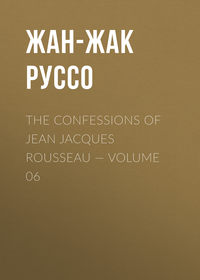 полная версия
полная версияThe Confessions of Jean Jacques Rousseau — Volume 11
Whilst my situation became worse the printing of 'Emilius' went on more slowly, and was at length suspended without my being able to learn the reason why; Guy did not deign to answer my letter of inquiry, and I could obtain no information from any person of what was going forward. M. de Malesherbes being then in the country. A misfortune never makes me uneasy provided I know in what it consists; but it is my nature to be afraid of darkness, I tremble at the appearance of it; mystery always gives me inquietude, it is too opposite to my natural disposition, in which there is an openness bordering on imprudence. The sight of the most hideous monster would, I am of opinion, alarm me but little; but if by night I were to see a figure in a white sheet I should be afraid of it. My imagination, wrought upon by this long silence, was now employed in creating phantoms. I tormented myself the more in endeavoring to discover the impediment to the printing of my last and best production, as I had the publication of it much at heart; and as I always carried everything to an extreme, I imagined that I perceived in the suspension the suppression of the work. Yet, being unable to discover either the cause or manner of it, I remained in the most cruel state of suspense. I wrote letter after letter to Guy, to M. de Malesherbes and to Madam de Luxembourg, and not receiving answers, at least when I expected them, my head became so affected that I was not far from a delirium. I unfortunately heard that Father Griffet, a Jesuit, had spoken of 'Emilius' and repeated from it some passages. My imagination instantly unveiled to me the mystery of iniquity; I saw the whole progress of it as clearly as if it had been revealed to me. I figured to myself that the Jesuits, furious on account of the contemptuous manner in which I had spoken of colleges, were in possession of my work; that it was they who had delayed the publication; that, informed by their friend Guerin of my situation, and foreseeing my approaching dissolution, of which I myself had no manner of doubt, they wished to delay the appearance of the work until after that event, with an intention to curtail and mutilate it, and in favor of their own views, to attribute to me sentiments not my own. The number of facts and circumstances which occurred to my mind, in confirmation of this silly proposition, and gave it an appearance of truth supported by evidence and demonstration, is astonishing. I knew Guerin to be entirely in the interest of the Jesuits. I attributed to them all the friendly advances he had made me; I was persuaded he had, by their entreaties, pressed me to engage with Neaulme, who had given them the first sheets of my work; that they had afterwards found means to stop the printing of it by Duchesne, and perhaps to get possession of the manuscript to make such alterations in it as they should think proper, that after my death they might publish it disguised in their own manner. I had always perceived, notwithstanding the wheedling of Father Berthier, that the Jesuits did not like me, not only as an Encyclopedist, but because all my principles were more in opposition to their maxims and influence than the incredulity of my colleagues, since atheistical and devout fanaticism, approaching each other by their common enmity to toleration, may become united; a proof of which is seen in China, and in the cabal against myself; whereas religion, both reasonable and moral, taking away all power over the conscience, deprives those who assume that power of every resource. I knew the chancellor was a great friend to the Jesuits, and I had my fears less the son, intimidated by the father, should find himself under the necessity of abandoning the work he had protected. I besides imagined that I perceived this to be the case in the chicanery employed against me relative to the first two volumes, in which alterations were required for reasons of which I could not feel the force; whilst the other two volumes were known to contain things of such a nature as, had the censor objected to them in the manner he did to the passages he thought exceptionable in the others, would have required their being entirely written over again. I also understood, and M. de Malesherbes himself told me of it, that the Abbe de Grave, whom he had charged with the inspection of this edition, was another partisan of the Jesuits. I saw nothing but Jesuits, without considering that, upon the point of being suppressed, and wholly taken up in making their defence, they had something which interested them much more than the cavillings relative to a work in which they were not in question. I am wrong, however, in saying this did not occur to me; for I really thought of it, and M. de Malesherbes took care to make the observation to me the moment he heard of my extravagant suspicions. But by another of those absurdities of a man, who, from the bosom of obscurity, will absolutely judge of the secret of great affairs, with which he is totally unacquainted. I never could bring myself to believe the Jesuits were in danger, and I considered the rumor of their suppression as an artful manoeuvre of their own to deceive their adversaries. Their past successes, which had been uninterrupted, gave me so terrible an idea of the power, that I already was grieved at the overthrow of the parliament. I knew M. de Choiseul had prosecuted his studies under the Jesuits, that Madam de Pompadour was not upon bad terms with them, and that their league with favorites and ministers had constantly appeared advantageous to their order against their common enemies. The court seemed to remain neuter, and persuaded as I was that should the society receive a severe check it would not come from the parliament, I saw in the inaction of government the ground of their confidence and the omen of their triumph.
In fine, perceiving in the rumors of the day nothing more than art and dissimulation on their part, and thinking they, in their state of security, had time to watch over all their interests, I had had not the least doubt of their shortly crushing Jansenism, the parliament and the Encyclopedists, with every other association which should not submit to their yoke; and that if they ever suffered my work to appear, this would not happen until it should be so transformed as to favor their pretensions, and thus make use of my name the better to deceive my readers.
I felt my health and strength decline; and such was the horror with which my mind was filled, at the idea of dishonor to my memory in the work most worthy of myself, that I am surprised so many extravagant ideas did not occasion a speedy end to my existence. I never was so much afraid of death as at this time, and had I died with the apprehensions I then had upon my mind, I should have died in despair. At present, although I perceived no obstacle to the execution of the blackest and most dreadful conspiracy ever formed against the memory of a man, I shall die much more in peace, certain of leaving in my writings a testimony in my favor, and one which, sooner or later, will triumph over the calumnies of mankind.
M. de Malesherbes, who discovered the agitation of my mind, and to whom I acknowledged it, used such endeavors to restore me to tranquility as proved his excessive goodness of heart. Madam de Luxembourg aided him in his good work, and several times went to Duchesne to know in what state the edition was. At length the impression was again begun, and the progress of it became more rapid than ever, without my knowing for what reason it had been suspended. M. de Malesherbes took the trouble to come to Montmorency to calm my mind; in this he succeeded, and the full confidence I had in his uprightness having overcome the derangement of my poor head, gave efficacy to the endeavors he made to restore it. After what he had seen of my anguish and delirium, it was natural he should think I was to be pitied; and he really commiserated my situation. The expressions, incessantly repeated, of the philosophical cabal by which he was surrounded, occurred to his memory. When I went to live at the Hermitage, they, as I have already remarked, said I should not remain there long. When they saw I persevered, they charged me with obstinacy and pride, proceeding from a want of courage to retract, and insisted that my life was there a burden to me; in short, that I was very wretched. M. de Malesherbes believed this really to be the case, and wrote to me upon the subject. This error in a man for whom I had so much esteem gave me some pain, and I wrote to him four letters successively, in which I stated the real motives of my conduct, and made him fully acquainted with my taste, inclination and character, and with the most interior sentiments of my heart. These letters, written hastily, almost without taking pen from paper, and which I neither copied, corrected, nor even read, are perhaps the only things I ever wrote with facility, which, in the midst of my sufferings, was, I think, astonishing. I sighed, as I felt myself declining, at the thought of leaving in the midst of honest men an opinion of me so far from truth; and by the sketch hastily given in my four letters, I endeavored, in some measure, to substitute them to the memoirs I had proposed to write. They are expressive of my grief to M. de Malesherbes, who showed them in Paris, and are, besides, a kind of summary of what I here give in detail, and, on this account, merit preservation. The copy I begged of them some years afterwards will be found amongst my papers.
The only thing which continued to give me pain, in the idea of my approaching dissolution, was my not having a man of letters for a friend, to whom I could confide my papers, that after my death he might take a proper choice of such as were worthy of publication.
After my journey to Geneva, I conceived a friendship for Moulton; this young man pleased me, and I could have wished him to receive my last breath. I expressed to him this desire, and am of opinion he would readily have complied with it, had not his affairs prevented him from so doing. Deprived of this consolation, I still wished to give him a mark of my confidence by sending him the 'Profession of Faith of the Savoyard Vicar' before it was published. He was pleased with the work, but did not in his answer seem so fully to expect from it the effect of which I had but little doubt. He wished to receive from me some fragment which I had not given to anybody else. I sent him the funeral oration of the late Duke of Orleans; this I had written for the Abbe Darty, who had not pronounced it, because, contrary to his expectation, another person was appointed to perform that ceremony.
The printing of Emilius, after having been again taken in hand, was continued and completed without much difficulty; and I remarked this singularity, that after the curtailings so much insisted upon in the first two volumes, the last two were passed over without an objection, and their contents did not delay the publication for a moment. I had, however, some uneasiness which I must not pass over in silence. After having been afraid of the Jesuits, I begun to fear the Jansenists and philosophers. An enemy to party, faction and cabal, I never heard the least good of parties concerned in them. The gossips had quitted their old abode and taken up their residence by the side of me, so that in their chamber, everything said in mine, and upon the terrace, was distinctly heard; and from their garden it would have been easy to scale the low wall by which it was separated from my alcove. This was become my study; my table was covered with proofsheets of Emilius and the Social Contract and stitching these sheets as they were sent to me, I had all my volumes a long time before they were published. My negligence and the confidence I had in M. Mathas, in whose garden I was shut up, frequently made me forget to lock the door at night, and in the morning I several times found it wide open; this, however, would not have given me the least inquietude had I not thought my papers seemed to have been deranged. After having several times made the same remark, I became more careful, and locked the door. The lock was a bad one, and the key turned in it no more than half round. As I became more attentive, I found my papers in a much greater confusion than they were when I left everything open. At length I missed one of my volumes without knowing what was become of it until the morning of the third day, when I again found it upon the table. I never suspected either M. Mathas or his nephew M. du Moulin, knowing myself to be beloved by both, and my confidence in them was unbounded. That I had in the gossips began to diminish. Although they were Jansenists, I knew them to have some connection with D' Alembert, and moreover they all three lodged in the same house. This gave me some uneasiness, and put me more upon my guard. I removed my papers from the alcove to my chamber, and dropped my acquaintance with these people, having learned they had shown in several houses the first volume of 'Emilius', which I had been imprudent enough to lend them. Although they continued until my departure to be my neighbors I never, after my first suspicions, had the least communication with them. The 'Social Contract' appeared a month or two before 'Emilius'. Rey, whom I had desired never secretly to introduce into France any of my books, applied to the magistrate for leave to send this book by Rouen, to which place he sent his package by sea. He received no answer, and his bales, after remaining at Rouen several months, were returned to him, but not until an attempt had been made to confiscate them; this, probably, would have been done had not he made a great clamor. Several persons, whose curiosity the work had excited, sent to Amsterdam for copies, which were circulated without being much noticed. Maulion, who had heard of this, and had, I believe, seen the work, spoke to me on the subject with an air of mystery which surprised me, and would likewise have made me uneasy if, certain of having conformed to every rule, I had not by virtue of my grand maxim, kept my mind calm. I moreover had no doubt but M. de Choiseul, already well disposed towards me, and sensible of the eulogium of his administration, which my esteem for him had induced me to make in the work, would support me against the malevolence of Madam de Pompadour.
I certainly had then as much reason as ever to hope for the goodness of M. de Luxembourg, and even for his assistance in case of need; for he never at any time had given me more frequent and more pointed marks of his friendship. At the journey of Easter, my melancholy state no longer permitting me to go to the castle, he never suffered a day to pass without coming to see me, and at length, perceiving my sufferings to be incessant, he prevailed upon me to determine to see Friar Come. He immediately sent for him, came with him, and had the courage, uncommon to a man of his rank, to remain with me during the operation which was cruel and tedious. Upon the first examination, Come thought he found a great stone, and told me so; at the second, he could not find it again. After having made a third attempt with so much care and circumspection that I thought the time long, he declared there was no stone, but that the prostate gland was schirrous and considerably thickened. He besides added, that I had a great deal to suffer, and should live a long time. Should the second prediction be as fully accomplished as the first, my sufferings are far from being at an end.
It was thus I learned after having been so many years treated for disorders which I never had, that my incurable disease, without being mortal, would last as long as myself. My imagination, repressed by this information, no longer presented to me in prospective a cruel death in the agonies of the stone.
Delivered from imaginary evils, more cruel to me than those which were real, I more patiently suffered the latter. It is certain I have since suffered less from my disorder than I had done before, and every time I recollect that I owe this alleviation to M. de Luxembourg, his memory becomes more dear to me.
Restored, as I may say, to life, and more than ever occupied with the plan according to which I was determined to pass the rest of my days, all the obstacle to the immediate execution of my design was the publication of 'Emilius'. I thought of Touraine where I had already been and which pleased me much, as well on account of the mildness of the climate, as on that of the character of the inhabitants.
'La terra molle lieta a dilettosa Simile a se l'habitator produce.'I had already spoken of my project to M. de Luxembourg, who endeavored to dissuade me from it; I mentioned it to him a second time as a thing resolved upon. He then offered me the castle of Merlon, fifteen leagues from Paris, as an asylum which might be agreeable to me, and where he and Madam de Luxembourg would have a real pleasure in seeing me settled. The proposition made a pleasing impression on my mind. But the first thing necessary was to see the place, and we agreed upon a day when the marechal was to send his valet de chambre with a carriage to take me to it. On the day appointed, I was much indisposed; the journey was postponed, and different circumstances prevented me from ever making it. I have since learned the estate of Merlou did not belong to the marechal but to his lady, on which account I was the less sorry I had not gone to live there.
'Emilius' was at length given to the public, without my having heard further of retrenchments or difficulties. Previous to the publication, the marechal asked me for all the letters M. de Malesherbes had written to me on the subject of the work. My great confidence in both, and the perfect security in which I felt myself, prevented me from reflecting upon this extraordinary and even alarming request. I returned all the letters excepting one or two which, from inattention, were left between the leaves of a book. A little time before this, M. de Malesherbes told me he should withdraw the letters I had written to Duchesne during my alarm relative to the Jesuits, and, it must be confessed, these letters did no great honor to my reason. But in my answer I assured him I would not in anything pass for being better than I was, and that he might leave the letters where they were. I know not what he resolved upon.
The publication of this work was not succeeded by the applause which had followed that of all my other writings. No work was ever more highly spoken of in private, nor had any literary production ever had less public approbation. What was said and written to me upon the subject by persons most capable of judging, confirmed me in my opinion that it was the best, as well as the most important of all the works I had produced. But everything favorable was said with an air of the most extraordinary mystery, as if there had been a necessity of keeping it a secret. Madam de Boufflers, who wrote to me that the author of the work merited a statue, and the homage of mankind, at the end of her letter desired it might be returned to her. D'Alembert, who in his note said the work gave me a decided superiority, and ought to place me at the head of men of letters, did not sign what he wrote, although he had signed every note I had before received from him. Duclos, a sure friend, a man of veracity, but circumspect, although he had a good opinion of the work, avoided mentioning it in his letters to me. La Condomine fell upon the Confession of Faith, and wandered from the subject. Clairaut confined himself to the same part; but he was not afraid of expressing to me the emotion which the reading of it had caused in him, and in the most direct terms wrote to me that it had warmed his old imagination: of all those to whom I had sent my book, he was the only person who spoke freely what he thought of it.
Mathas, to whom I also had given a copy before the publication, lent it to M. de Blaire, counsellor in the parliament of Strasbourg. M. de Blaire had a country-house at St. Gratien, and Mathas, his old acquaintance, sometimes went to see him there. He made him read Emilius before it was published. When he returned it to him, M. de Blaire expressed himself in the following terms, which were repeated to me the same day: "M. Mathas, this is a very fine work, but it will in a short time be spoken of more than, for the author might be wished." I laughed at the prediction, and saw in it nothing more than the importance of a man of the robe, who treats everything with an air of mystery. All the alarming observations repeated to me made no impression upon my mind, and, far from foreseeing the catastrophe so near at hand, certain of the utility and excellence of my work, and that I had in every respect conformed to established rules; convinced, as I thought I was that I should be supported by all the credit of M. de Luxembourg and the favor of the ministry, I was satisfied with myself for the resolution I had taken to retire in the midst of my triumphs, and at my return to crush those by whom I was envied.
One thing in the publication of the work alarmed me, less on account of my safety than for the unburdening of my mind. At the Hermitage and at Montmorency I had seen with indignation the vexations which the jealous care of the pleasures of princes causes to be exercised on wretched peasants, forced to suffer the havoc made by game in their fields, without daring to take any other measure to prevent this devastation than that of making a noise, passing the night amongst the beans and peas, with drums, kettles and bells, to keep off the wild boars. As I had been a witness to the barbarous cruelty with which the Comte de Charolois treated these poor people, I had toward the end of Emilius exclaimed against it. This was another infraction of my maxims, which has not remained unpunished. I was informed that the people of the Prince of Conti were but little less severe upon his, estates; I trembled less that prince, for whom I was penetrated with respect and gratitude, should take to his own account what shocked humanity had made me say on that of others, and feel himself offended. Yet, as my conscience fully acquitted me upon this article, I made myself easy, and by so doing acted wisely: at least, I have not heard that this great prince took notice of the passage, which, besides, was written long before I had the honor of being known to him.
A few days either before or after the publication of my work, for I do not exactly recollect the time, there appeared another work upon the same subject, taken verbatim from my first volume, except a few stupid things which were joined to the extract. The book bore the name of a Genevese, one Balexsert, and, according to the title-page, had gained the premium in the Academy of Harlem. I easily imagined the academy and the premium to be newly founded, the better to conceal the plagiarism from the eyes of the public; but I further perceived there was some prior intrigue which I could not unravel; either by the lending of my manuscript, without which the theft could not have been committed, or for the purpose of forging the story of the pretended premium, to which it was necessary to give some foundation. It was not until several years afterwards, that by a word which escaped D'Ivernois, I penetrated the mystery and discovered those by whom Balexsert had been brought forward.
The low murmurings which precede a storm began to be heard, and men of penetration clearly saw there was something gathering, relative to me and my book, which would shortly break over my head. For my part my stupidity was such, that, far from foreseeing my misfortune, I did not suspect even the cause of it after I had felt its effect. It was artfully given out that while the Jesuits were treated with severity, no indulgence could be shown to books nor the authors of them in which religion was attacked. I was reproached with having put my name to Emilius, as if I had not put it to all my other works of which nothing was said. Government seemed to fear it should be obliged to take some steps which circumstances rendered necessary on account of my imprudence. Rumors to this effect reached my ears, but gave me not much uneasiness: it never even came into my head, that there could be the least thing in the whole affair which related to me personally, so perfectly irreproachable and well supported did I think myself; having besides conformed to every ministerial regulation, I did not apprehend Madam de Luxembourg would leave me in difficulties for an error, which, if it existed, proceeded entirely from herself. But knowing the manner of proceeding in like cases, and that it was customary to punish booksellers while authors were favored; I had some uneasiness on account of poor Duchesne, whom I saw exposed to danger, should M. de Malesherbes abandon him.









